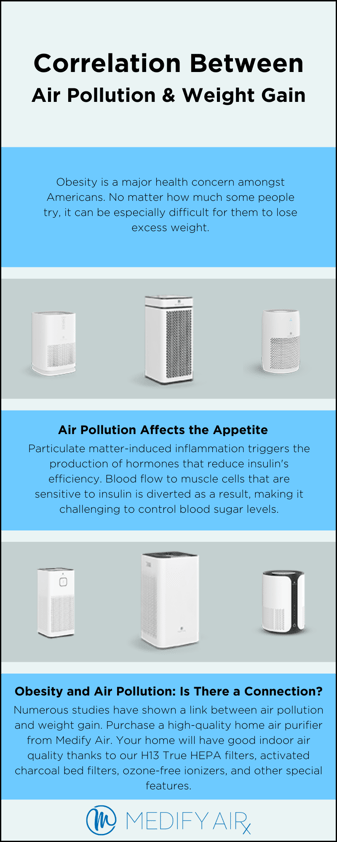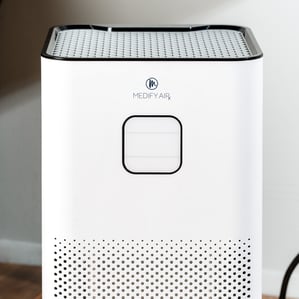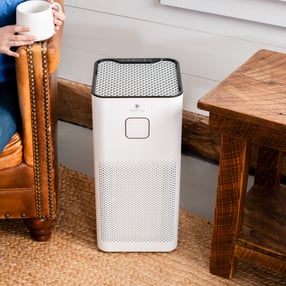Weight gain is a major health concern amongst Americans. No matter how much some people try, it can be especially difficult for them to lose excess weight.
A poor diet and a sedentary lifestyle are major components to obesity and on the flipside, a healthy diet and an active lifestyle are primary weight management factors. However, there are some minor external factors that can significantly impact your overall health, and one of these factors which we are going to discuss is weight.
One of the factors that have been identified to correlate with weight gain is poor air quality. As one of the best air purifier brands, it is our responsibility to bring the correct information to our audience. So, we here at Medify Air have started looking at some existing research and evidence on whether there is a substantial correlation or not. And we found some compelling answers— let’s see what the science has to say about the correlation between air pollution and weight gain.

Air Pollution Affects the Appetite
A 2014 study published in Environmental Health suggests prolonged exposure to air pollution can affect appetite. This can directly affect body weight.
The study says inhaling fine and ultrafine particles (PM2.5 or diameter less than 0.1 microns) can disrupt metabolic functions. Poor air quality effects the ability of the lungs to absorb a high amount of oxygen which, in turn, affects the ability of cells to perform metabolic functions.
The irritation caused by particulate matter circling the air results in the release of hormones that make insulin less effective. This causes the body to divert the blood from insulin-sensitive muscle cells, making it more difficult to regulate blood sugar levels.
This lack of insulin response and resulting inflammation disrupts the brain pathways that regulate appetite. Even if you are full or satiated, you will feel hungry, prompting you to eat more than your body truly needs.
In fact, Berkely researchers found a 13.6% increase in body mass index (BMI) when exposed to polluted air.

Air Pollution and Obesity: A Striking Correlation
Arteriosclerosis, Thrombosis, and Vascular Biology were the first to tackle this question in a 2010 study. In this study, they had two batches of healthy mice.
To one set of mice, they gave polluted air filled with particulate matter, whereas to the other set of mice, they provided filtered air. Over a period of time, they weighed the mice and recorded their observations.
Over 10 weeks, they noticed that the set of mice exposed to polluted air gained weight around the midsection and internal organs. The fat cells were 20% larger in size as compared to normal fat cell size. Also, this set of mice became less insulin sensitive, pushing them to develop type 2 diabetes over time.
Since the mice and humans have a genome similarity, these results can indicate that humans may have similar effects on their weight and fat cells when exposed to air pollution.
Conclusion
Although several other studies have highlighted the correlation between air pollution and weight gain, diet and lifestyle are still highly responsible for obesity.
However, you can easily tackle air pollution at a personal level by investing in a good quality air purifier for home. By removing excess particulate matter, you can reduce the possibility of weight gain through external factors.

Buy a good quality home air purifier from our vast range of air purifier models at Medify Air. With our advanced features, such as H13 True HEPA filters, activated charcoal bed filters, and more, Medify Air purifiers ensure that you will have good indoor air quality in your home.
If you want to ensure good quality air for you, your family, and your pets, check out Medify Air purifiers today!